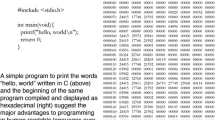Abstract
Object oriented programming is a technique for managing complexity by breaking a large program into a collection of interacting objects. These objects communicate by passing messages from one object to another — each object only has to concern itself with handling the messages it receives and then sending out suitable replies. The process is very similar to the way in which windows operate under Windows 98 and so it is natural to associate each window with a corresponding C++ object. This chapter introduces the essential notions of object oriented programming and discusses how to convert the program framework code developed in chapter 2 to an object oriented model. The main topics include:
-
separation of object implementation and interface
-
encapsulation and polymorphism
-
C++ inheritance and virtual functions
-
associating C++ objects and graphical components
Access this chapter
Tax calculation will be finalised at checkout
Purchases are for personal use only
Preview
Unable to display preview. Download preview PDF.
Similar content being viewed by others
Rights and permissions
Copyright information
© 1998 Springer-Verlag London Limited
About this chapter
Cite this chapter
Welmsley, M. (1998). Object Orientation. In: Graphics Programming in C++. Springer, London. https://doi.org/10.1007/978-1-4471-0905-1_3
Download citation
DOI: https://doi.org/10.1007/978-1-4471-0905-1_3
Publisher Name: Springer, London
Print ISBN: 978-1-4471-1231-0
Online ISBN: 978-1-4471-0905-1
eBook Packages: Springer Book Archive




